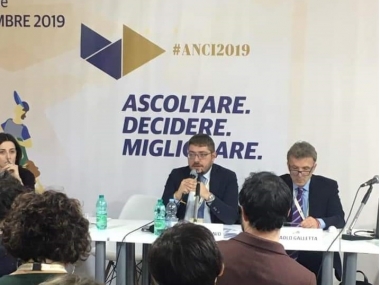URBACT CITIES, UIA AND EU AGENDA
Edited on
02 December 2019The annual ANCI conference (Italian National Association of Municiaplities), which took place in Arezzo on 20th November 2019, saw the participation of numerous cities that put in place innovative policies and actions through the European programmes of territorial cooperation UIA and URBACT, focusing the debate on the present and the future of cities in Italy: a network of motivated cities that confront themselves with Europe and produce actions with a CONCRETE impact on their territories and on people's lives.

An extremely useful and stimulating meeting that involved program secretariats and central authorities to ensure that experiences, stories and objectives of Italian cities are included in the next European programming period.
Along with the interventions of the representatives of the Ministry of Infrastructure and the Agency for Territorial Cohesion, which underlined the consistent participation of Italian Municipalities in the URBACT and UIA programmes, the testimonies of the cities present at the meeting were fundamental to illustrate their experience and the significant added value achieved through the implementation of their projects.
The closing speech of conference was reserved to the city of Rome, in which Ms Fiammetta Curcio, ad-hoc expert in the topic of governance for the RU: RBAN project, retraced the history of the project led by Rome, starting with the Good Practice City Award received in Tallinn in October 2017, to the construction of the project Network and the actions already implemented. Among them the launch and training of a "generation" of Gardenisers in the 6 partner cities, a new professional figure with the task of facilitator and mediator in the management of urban gardens, the encouragement to draw up a Regulation of Urban gardens, following the example of Rome’s Regulation, adapting it to their local specificity and adopted by their city administration and, finally, the development of relations between citizens, either individuals or associations, involved or potentially involved in the management of this important urban phenomenon.
 Submitted by Patricia Hernandez on
Submitted by Patricia Hernandez on
